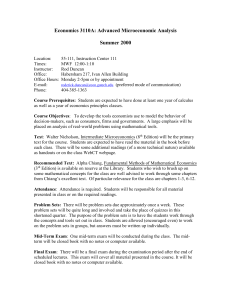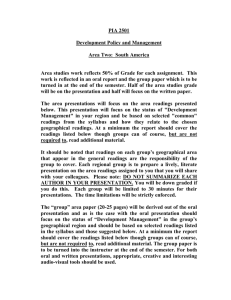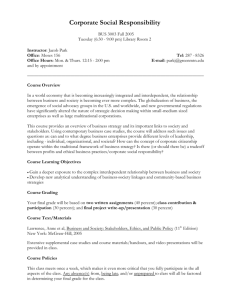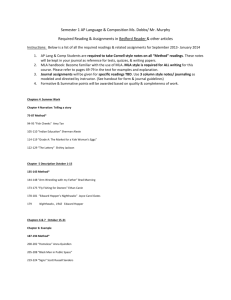EDPS 453 Teacher Leadership Syllabus MARK SMYLIE UIC
advertisement
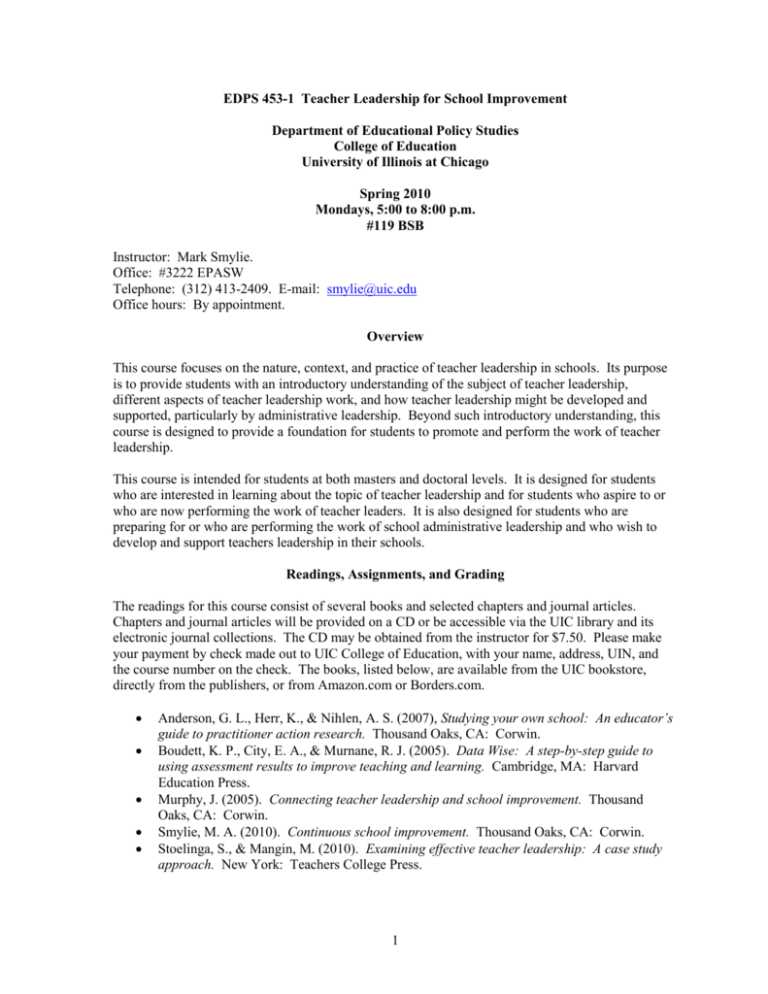
EDPS 453-1 Teacher Leadership for School Improvement Department of Educational Policy Studies College of Education University of Illinois at Chicago Spring 2010 Mondays, 5:00 to 8:00 p.m. #119 BSB Instructor: Mark Smylie. Office: #3222 EPASW Telephone: (312) 413-2409. E-mail: smylie@uic.edu Office hours: By appointment. Overview This course focuses on the nature, context, and practice of teacher leadership in schools. Its purpose is to provide students with an introductory understanding of the subject of teacher leadership, different aspects of teacher leadership work, and how teacher leadership might be developed and supported, particularly by administrative leadership. Beyond such introductory understanding, this course is designed to provide a foundation for students to promote and perform the work of teacher leadership. This course is intended for students at both masters and doctoral levels. It is designed for students who are interested in learning about the topic of teacher leadership and for students who aspire to or who are now performing the work of teacher leaders. It is also designed for students who are preparing for or who are performing the work of school administrative leadership and who wish to develop and support teachers leadership in their schools. Readings, Assignments, and Grading The readings for this course consist of several books and selected chapters and journal articles. Chapters and journal articles will be provided on a CD or be accessible via the UIC library and its electronic journal collections. The CD may be obtained from the instructor for $7.50. Please make your payment by check made out to UIC College of Education, with your name, address, UIN, and the course number on the check. The books, listed below, are available from the UIC bookstore, directly from the publishers, or from Amazon.com or Borders.com. Anderson, G. L., Herr, K., & Nihlen, A. S. (2007), Studying your own school: An educator’s guide to practitioner action research. Thousand Oaks, CA: Corwin. Boudett, K. P., City, E. A., & Murnane, R. J. (2005). Data Wise: A step-by-step guide to using assessment results to improve teaching and learning. Cambridge, MA: Harvard Education Press. Murphy, J. (2005). Connecting teacher leadership and school improvement. Thousand Oaks, CA: Corwin. Smylie, M. A. (2010). Continuous school improvement. Thousand Oaks, CA: Corwin. Stoelinga, S., & Mangin, M. (2010). Examining effective teacher leadership: A case study approach. New York: Teachers College Press. 1 There are three assignments for the class. The first assignment involves an observation, interview, and analysis of a teacher leader “in action.” The second assignment will be a take-home mid-term examination. This examination will provide a mid-point assessment of students’ understanding and ability to work with the content of the first part of the course. The third assignment will be a final paper that will focus on the synthesis and analysis of major ideas and issues presented throughout the entire course. Specific instructions for each assignment will be distributed during the semester. This course will be conducted largely as a seminar, not as a lecture-discussion. It requires full preparation and active participation each week. Attendance is imperative. Participation will play an important role in the success of the class and therefore in assessing student performance. In order to receive an “A” for class participation, a student must not only be in attendance but must make regular, substantive, and productive contributions throughout the semester to advance classmates’ and the instructor’s understanding of the subjects at hand. Final grades for this course will be determined according to the following breakdown: Teacher leader observation and analysis Mid-term examination Class Participation Final paper 25% 25% 15 % 35% Please note the following…. If preparation for class becomes lax, inducements may be introduced and play a role in the final grading. If necessary, these inducements will become “flex points” and constitute up to 15% of final grades. The percentage weights given to other assignments would be reduced commensurately (e.g., teacher leadership observation and analysis reduced from 25% to 20%, class leadership from 25% to 20%, final paper from 35% to 30%). Late assignments will not be accepted without arrangement with the instructor at least one week before the due date. “Incompletes” for the course will not be given except for compelling reasons. If a student has such a reason and wishes to take an incomplete, the instructor must be notified no later than the 15th week of the semester (the April 19 class). All work in this course is governed by UIC’s Honor Code and by the ethical standards of the American Educational Research Association (AERA) and the American Psychological Association (APA). The UIC honor code and the AERA and APA standards are available online. Students are responsible for becoming familiar with this code and these standards. Particular attention should be paid to the proper use and attribution of others’ work and to plagiarism. UIC strives to ensure the accessibility of programs, classes, and services to students with disabilities. Reasonable accommodations can be arranged for students with various types of disabilities, such as documented learning disabilities, vision or hearing impairments, and emotional or physical disabilities. If you need accommodations for this class, be sure to register with the Office of Disability Services, 1190 SSB (312) 413-2183 and let the instructor know your needs. Schedule of Topics and Assignments NOTE: There are several class sessions for which a heavy amount of reading required. Those sessions occur on February 15 and 22, March 15, and April 12. You are advised to read ahead whenever you are able (take good notes when you do!). 2 January 11 Introduction to course, to each other. The purposes and arguments for teacher leadership. January 18 Martin Luther King Holiday. No class. January 25 Framing Teacher Leadership: Roles, Functions, and Systems. Readings: Barth (2001), “Teacher leader.” Murphy (2005), Connecting teacher leadership and school improvement, Part I: Unpacking the concept, Chapters 1-5. Stoelinga & Mangin (2010), Examining effective teacher leadership: A case study approach, Part I: Understanding the work of teacher instructional leaders—the vignettes. February 1 Organizational Contexts of Teacher Leadership. Readings: Smylie & Denny (1990), “Teacher leadership: Tensions and ambiguities in organizational perspective.” Murphy (2005), Connecting teacher leadership and school improvement, Chapter 6, “Confronting organizational and cultural barriers.” Stoelinga & Mangin (2010), Examining effective teacher leadership: A case study approach, Case 2: School norms and structures: Meg; Case 3: Relationships: MaryAnn; Part 3: Situating instructional teacher leadership in complex contexts. February 8 Developing and Supporting Teacher Leadership: What Principals Can Do. Readings: Murphy (2005), Connecting teacher leadership and school improvement, Chapter 7, “Promoting teacher leadership from the principal’s office” and Chapter 8, “Developing teacher leaders.” Mangin, (2007), “Facilitating elementary principals’ support for instructional teacher leadership.” OR Matsumura, et al. (2009), “Leadership for literacy coaching.” Murphy et al. (2009), “The role of the principal in fostering the development of distributed leadership.” Stoelinga & Mangin (2010), Examining effective teacher leadership: A case study approach, Case 4: Principal support: Jeff. February 15 Individual and Organizational Change. Readings: Hammerness et al. (2005), “How teachers learn and develop.” Weick & Quinn (1999), “Organizational change and development.” Burke (2008), “Leading organization change.” Fullan & Miles (1992), “Getting reform right.” Due: Progress report on teacher leadership observation and analysis. 3 February 22 Building Professional Learning Communities. Readings: Wenger et al. (2002), Cultivating communities of practice, Chapters 1-4. McLaughlin & Talbert (2006), Building school-based teacher learning communities, Chapters 1-3. Bryk et al (1999), “Professional community in Chicago elementary schools.” Scribner et al (2002), “The paradox of professional community.” Note: Mid-term examination handed out. March 1 Leadership of Teams. Readings: Conley et al (2004), “Teacher workgroup effectiveness.” Pounder (1999), “Teacher teams.” Scribner et al. (2007), “Teacher teams and distributed leadership.” Hackman (1998), “Why teams don’t work.” Due: Mid-term examination. March 8 Designing and Leading Professional Development. Readings: Wei et al. (2009), Professional learning in the learning profession. National Staff Development Council (2001), Standards. Can be found at http://www.nsdc.org/standards/. Read descriptions of standards not just the standards themselves. Review: Hammerness (2005), “How teachers learn and develop.” March 15 Coaching and Mentoring for Instructional Improvement. Readings: Taylor (2008), “Instructional coaching: The state of the art.” Showers & Joyce (1996), “The evolution of peer coaching.” Little (1990), “The mentoring phenomenon.” Tillman (2005), “Mentoring new teachers.” Stoelinga & Mangin (2010), Examining effective teacher leadership: A case study approach, Case 1: Leading learning: Erin. See: Due: International Reading Association (2006), Standards for middle and high school literacy coaches. Teacher leadership observation and analysis. March 22 Spring break. No class! Don’t forget to read ahead! March 29 Curriculum Planning and Development. Readings: Gardner, (2006), Five minds of the future, Chapters 1 and 7. National Research Council (2000), How people learn, Chapters 1 and 2. Glatthorn & Jailall (2009), The principal as curriculum leader, selected chapters. 4 April 5 Technology Leadership. Readings: Anderson & Dexter (2005), “School technology leadership.” Dexter, Anderson, & Ronnkvist (2002), “Quality technology support.” Dexter et al. (2003), “Leading the learning.” April 12 Using Data and Action Research for Instructional Improvement. Readings: Boudett et al (2005), Data wise: A step-by-step guide to using assessment results to improve teaching and learning. Anderson et al. (2007), Studying your own school: An educator’s guide to practitioner action research, Chapters 1-3, and 5. Stoelinga & Mangin (2010), Examining effective teacher leadership: A case study approach, Case 5: Data-based improvement: Janice. April 19 Strategic Planning and Continuous School Improvement. Readings: Bryson (1995), Strategic planning for public and nonprofit organizations, Chapters 1, 2, and 11. Crandall et al. (1986), “Strategic planning issues that bear on the success of school improvement efforts.” Smylie (2010), Continuous school improvement, Chapters 4-7. April 26 Course Summary and Benedictions. May 6 Final assignment due. 5
